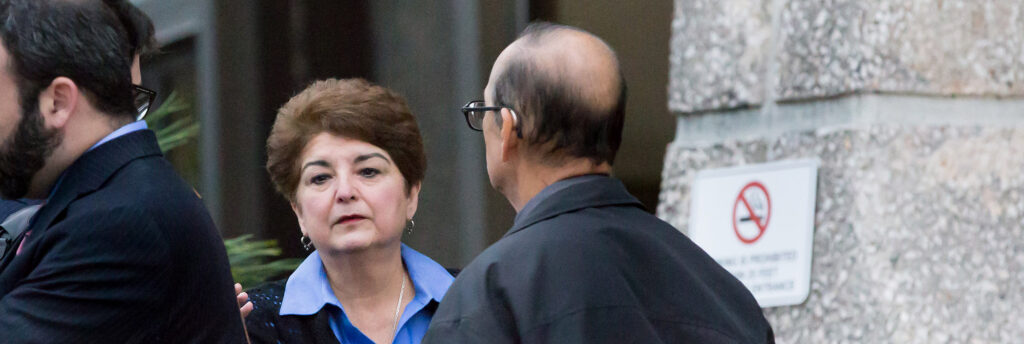For school boards short on savvy, corruption comes knocking

Olga Hernandez leaves the U.S. courthouse in San Antonio, Texas, on December 14, 2017.
The courtroom erupted into gasps and whispered prayers as U.S. District Judge Xavier Rodriguez read the first “not guilty” verdict in Olga Hernandez’s public corruption trial. After calling to order the jubilant crowd of around 40 friends and family, Rodriguez read the verdict for the second charge: “[T]he jury finds the defendant not guilty.”
The whispers became tears, then cheers, prompting another call to order so that court could be adjourned.
Leaving the courtroom amid a clutch of hugs and exultations, Hernandez, a former San Antonio Independent School District trustee, stopped briefly to speak to reporters.
“I’m just glad I got to tell my side of the story,” said Hernandez, who served on the board for 11 years. “I was never bribed.”
She had really believed, she said, that those “crooks” had been her friends.
The case
On Feb. 16, Hernandez was arrested as part of an FBI investigation to expose a bribery scheme touching several local school districts. Samuel Mullen and Joshua Cerna of insurance company Mullen Pension and Benefits Group have already pled guilty to paying William Haff, an independent consultant hired by SAISD and other local districts to advise on insurance matters, to steer contracts their way.
Last Tuesday, on the second day of Hernandez’ trial, SAISD Chief of Staff Tiffany Grant answered questions meticulously and dispassionately, reviewing meeting minutes, board updates, and budget minutia for the large urban school district. The prosecutor asked Grant how SAISD would have spent the $2.8 million lost to a bribery scheme in 2012, the same year the district was reeling from state budget cuts.
Grant drew a careful breath, and shook her head as she gave a litany of district needs: student supports, classroom resources, employee benefits, pay raises.
The scheme that defrauded SAISD employees and taxpayers is familiar to Bexar County and districts across Texas. Cerna, a former board member of Harlandale ISD, has confessed to similar conspiracies with Mullen in Edgewood ISD and South San Antonio ISD.
The Texas Education Agency recently opened an investigation into Harlandale ISD, where Superintendent Rey Madrigal has been accused of nepotism and favoring certain vendors. The San Antonio Express-News reported that Madrigal claims sincere friendship with Mullen, similar to the kind of relationship Hernandez described with Mullen, with similar perks.
While working in Ysleta ISD in El Paso, former SAISD employee Irma Hernandez (no relation to Olga Hernandez) was first exposed to Sam Mullen and his wife, Diane, as they tried to win contracts there, she said. During the trial, Irma Hernandez described a party at the Mullen’s home attended by a superintendent, local school district employees, and insurance carriers. She dated Diane’s son, Steven Brooks, and said on the witness stand that Brooks explained how his parents strategically entertained school board members.
The fact that the conspirators targeted districts with high levels of poverty and low levels of adult educational attainment is not surprising.
While some have suggested that cultural influences of neighboring Mexico lead to ongoing corruption in South Texas local governments, FBI spokesperson Michelle Lee sees no evidence for this.
“We have public corruption squads throughout the FBI,” Lee said. “No one color has a monopoly on corruption.”
Racial and ethnic demography may not matter, but another kind of demography does present a pattern. Poorer districts without reservoirs of legal and financial professionals often fall prey to a certain kind of corruption as nepotism and favoritism work their way into governing bodies under the guise of “business as usual.”
Target-rich districts
Development and economic activity — and the talent pools that follow them — are not evenly distributed among Bexar County’s 16 public school districts. Relatively small Harlandale ISD, for instance, is the largest employer within its own boundaries. By contrast, five of the city’s 20 largest employers have headquarters within Northside ISD.
Economic isolation can result in a disparity between the professional acumen of board members and the vendors seeking to influence them.
In a 2012 U.S. Chamber of Commerce study of effective school boards, the researchers drew a distinct correlation between healthy business communities and strong school boards.
“Local business communities can play a key role in ensuring high-quality board members and candidates in a variety of ways. The business community can be a source of high-quality school board candidates, as many business leaders have key leadership, management, and financial skills and knowledge that can be valuable assets on a board,” the study says.
In districts serving lower income areas of the city, locally sourced trustees may have only a high school education. Candidates in the May 2017 school board elections across Bexar County demonstrated a sharp divide in educational attainment, with higher levels of education among candidates in more affluent districts. Races in wealthier districts drew candidates from financial, law, and government sectors. In poorer districts, most candidates held service industry, blue collar, and clerical positions.
As a result, many board members in small, lower income districts lack professional experience with the complex economic entities and government bureaucracies they will encounter as a school board member. Some districts provide training for these new board members, but many do not. The Texas Education Agency offers a two-day workshop for boards seeking to improve their performance. South San ISD recently participated in the workshop for the first time as part of its attempt to overcome decades of board dysfunction.
By contrast, boards in large, affluent districts often have more candidates to choose from, and more of those candidates have the skills needed to manage a district. Those with long track records of public service and fiscal responsibility can campaign on those credentials and win. Most of these districts still require additional training, either in-house or through the TEA.
In May 2017, Southside ISD voters unseated two board members accused of misconduct related to the awarding of contracts and employment. They were replaced by community members — one a CPS inspector and one a customer service representative. In April, former State Rep. John Lujan, a Southside ISD parent, told the Rivard Report that his neighbors had the heart for the job, but might find it difficult to clean up the entrenched culture of rule-bending and ethical compromises left behind by their predecessors.
“We need experienced professionals on these boards,” Lujan said.
In the May election, Northside ISD saw two such professional candidates vying for its only contested seat: Carole Harle, a long time educator and administrator who holds a Ph.D. in curriculum; and Paul Gass, a colonel in the U.S. Army Reserves.
For love or money?
Federal prosecutors were unable to prove that Hernandez was an integral part of the steering mechanism as the group’s inside woman on the school board. In exchange for her vote on the school board, the government claimed, Hernandez received trips, meals and jewelry in three states — a federal crime.
The defense acknowledged the relationship between Hernandez and the conspirators, claiming that, for Hernandez at least, the relationships with Mullen and Cerna were sincere, based in “fellowship, care and sharing.” This would mean that the gifts she received — trips to casinos, expensive meals and jewelry — were byproducts of friendship; the group trips to Las Vegas and Reno, Nevada, and Shreveport, Louisiana, were because of a mutual love of slot machines; and Hernandez never agreed to sell out the district she had loved as an alumna, employee and trustee. In opening arguments, Hernandez’s team went to great lengths to animate Cerna’s deep, spiritual “brotherhood” with Hernandez’s husband, a bond he betrayed when he turned on Hernandez to save his own skin by becoming an FBI informant.
In the end, the jury was not convinced that Hernandez committed a federal crime. However, the strategic “friendships” pursued by the Mullen group provide insight into the ways that public officials open themselves to the influence of those with corrupt motives.
In Hernandez’s case, both the prosecution and defense acknowledged that the relationship between the Mullen, Cerna, and Hernandez families had grown over time. What Hernandez said she saw as the natural blossom of friendship, the prosecution called “cultivating” on the part of the conspirators. Mullen and Cerna found common interests with Hernandez, involved their spouses and hers in what appeared to be genuine friendships, prayed with the Hernandezes together during difficult times, and asked the Hernandezes to witness a wedding vow renewal for Cerna and his wife.
All the while, the conspirators were winning large contracts with the district.
Referring to a trip with Hernandez and her husband to Las Vegas for a Super Bowl party, the prosecution entered into evidence a recording of Mullen saying, “A lot of business gets done that way.”
How business gets done
Sometimes, Lee explained, corrupt colleagues and contractors begin to groom malleable board members and employees into a culture of corruption and lax ethics. New board members are made to feel unsophisticated and naïve for expecting otherwise.
As the defense pointed out, in order for the schemes to work, the culture of “how things work” must extend to district administration. The prosecution alluded to some participation on the part of former SAISD Superintendent Sylvester Perez, claiming he also had a relationship with Mullen, and helped to protect Mullen’s commission when the district signed a contract with one of Mullen’s agencies. The prosecution suggested that Hernandez pressured Perez and others in the district as well.
In an interview with Folo Media, Perez denied any association with the Mullen group. The details of insurance contracts, he explained, are not something a superintendent decides.
“That’s why you have people in other departments (assessing insurance contracts),” Perez said. He described it as part of the system of checks and balances in place to keep such fraud from happening.
In their opening arguments, Hernandez’s defense made the case that several other departments would have had to either be complicit or duped in the conspiracy. Committees and subcommittees from employee benefits, human resources, and purchasing departments were all involved in the decision to recommend Mullen’s products to the board. They questioned the influence that Haff may have had on those committee members.
SAISD stands out among Mullen and Cerna’s conquests. It is not a small or rural district where a seven-member board will inevitably have ties to local contractors and vendors. However, in some ways Hernandez’s tight-knit single-member district functioned as small-town, and those with economic interest in her success were present throughout her campaigns. In her 2015 re-election campaign, Hernandez’s campaign cast her opponents as “outsiders” and herself as the true neighbor of SAISD’s District 6.
The article was published at For school boards short on savvy, corruption comes knocking.





